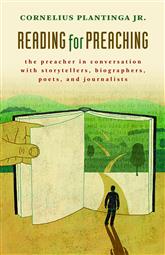 A review of Reading for Preaching: The Preacher in Conversation with Storytellers, Biographers, Poets, and Journalists by Cornelius Plantinga Jr. Published by Eerdmans.
A review of Reading for Preaching: The Preacher in Conversation with Storytellers, Biographers, Poets, and Journalists by Cornelius Plantinga Jr. Published by Eerdmans.
This could have been a very short book.
“Q: Should preachers read widely in order to be better preachers?
A: Yes.
The end.”
But that wouldn’t have been a book worth reading, whereas Reading for Preaching is well worth reading. Plantinga’s argument about why reading is worthwhile for preachers needs time to develop, to disarm preconceptions about reading and the well-read, and to soak in under the skin to where the heart lies.
And, at its best, all of this is exactly what this book—and what reading—does.
Cornelius Plantinga Jr. is president of Calvin Theological Seminary in Michigan. As such, he is careful to set the right foundations for his advocacy of reading. Yes, he says, the Bible must come first. No, it’s not just a way for the preacher to look like a clever clogs: “Everything depends on whether the quotations and phrases serve to make the gospel of grace sound more urgently alive or whether they serve merely to make the sermon more aesthetically pleasing.”
Rather, he argues that reading is something that expands our vision, helping us to understand other people and other places from the inside-out. Reading makes you wise, in the biblical sense. Further, good reading helps a preacher to sharpen the weapons they’re working with: the weapons of emotion, and language, and story. (Some readers even now may be wanting to buy this book for their preacher, if they have once too often been knocked into unconsciousness by the bluntness of those particular weapons. If that’s the case, you may also want to consider the graciousness of making the gift anonymous.)
Reading for Preaching is adapted from the Warfield Lectures that Plantinga delivered in 2012. The six short chapters that it’s been adapted into make for a short book, easy to read over an afternoon. And moreover, unlike many lecture series-to-book adaptations, it’s a pleasure to read. (It also won the Christianity Today 2014 Book of the Year.) Simply put, Plantinga writes like someone who reads. He has taken on the very lessons of reading that he espouses. As such, the book is both a pleasure to read and sharp enough to prick you into thoughtful reflection.
How many sermon listeners would not have wanted to echo this little passage to their preacher, at some point or another?
“Let me add that clarity and economy are not merely rhetorical virtues. They are character virtues too … don’t drive your listeners nuts. The concise preacher obeys a second great commandment too: don’t waste your listeners’ time.”
If that is the case, Plantinga argues, a steady diet of great literature is not just as an optional extra, but as a responsibility for the good preacher: “If I peddle my dogmatic myopia from the pulpit I subvert the richer understandings of life within the gospel and disqualify myself as a responsible minister of it.”
What this book reminds me of is the best kind of conversations, with a considered conversation partner who has years of wisdom, and the experience of different seasons of life, and an eloquent turn of phrase. Conversations like that are hard to come by, which is why it’s a pleasure to recommend books like this.
It would be a good spur for preachers who are readers, yes, but it’s also a convincer for those who aren’t regular readers yet. And it would be good for preachers, but also for thoughtful Christians who want reasons (and an excellent reading list) to start engaging with the world of literature, in their own thought and life.
This could have been a very short review.
“Q: Should preachers, and other interested Christians, read this book in order to impel them towards a broader, grander, deeper vision of what it is to live life under the sun?
A: Yes.
The end.”
Email This Story
Why not send this to a friend?

